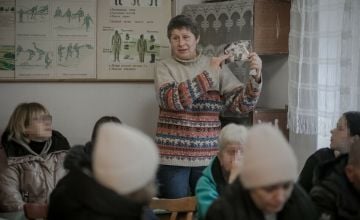
Knowledge Hub
The conflict in Ukraine has left many families with urgent needs, from food, power and shelter to healthcare. Together with our partners, we are operating the Joint Emergency Response in Ukraine (JERU). Part of our work is focused on psychosocial support (PSS) for both adults and children. We have been offering group sessions for people to share their experiences and begin to process and manage their conflict related trauma.
Kateryna* is one of the women who has been supported by the PSS sessions. Here, she tells us in her own words how her life changed after the conflict and how it has affected her mental health.
“I’ve lived there for 63 years and I’ve never left for such a long period of time. We were warned not to have any suitcases or large items– just backpacks. We just had a bottle of water and documents and that’s how we left. We were standing on the train – they didn’t have any seats. When we came to this small town, it was quiet and people hosted us and accepted us, gave us food, coffee and a bed.
“At the beginning we were in a frozen state, we were literally scared of any knock, any hit. But now we have calmed down at a bit because we were provided with accommodation and clothes so we have all the necessities for a basic normal life.
“We aren’t hearing any explosions so there is no fear. However, a few days ago there was an aircraft flying over and it was so terrifying, even though we knew it was a Ukrainian one it was still terrifying. It is really stressful because when you sleep you dream about the conflict. It gives you flashbacks. You hear the news and see pictures. Some people couldn’t leave their home town and when you hear what is happening there it is scary.”
How PSS sessions are supporting Kateryna
When we met Kateryna she had attended four PSS group sessions and told us that “it helps that you can cry and speak out.”
“It is interaction with people who have suffered and faced the same circumstances as I did. When you speak out, they understand what you mean. When we discuss this, we understand what other people mean. The people who are here survived this. They can cry, I can cry. I don’t get surprised when they cry. We speak the same language, and when I come we can hear each other out. We understand.”

What life looks like now
“We read books – I checked out the library as soon as I came here. I am reading everything about love. I am a librarian, it is what I worked as before. The first thing I found here was the great library. They gave us books and magazines when we came here, and didn’t ask for anything in return. I also listen to music. I prefer classical music and always have music in the background. My daughter is into embroidery – she makes handicrafts.
“We are grateful – sometimes there are concerts and performances here. I used to always take my daughter or go with friends to concerts and exhibitions, which is what we lack. That’s what we miss. It is so terrifying, but your soul wants something to lift it up.
“I miss my colleagues, my library – it was part of a university with many students. Now every day we wake up in a stressful state, until you pull yourself out in to the street and have a chat with someone. I miss the vibe of the city. And I miss my relatives who are far away. We keep in touch on Viber (a social media platform) but I miss it so much. The first thing I do when I wake up is check my messages. We always visited each other, and had some plans in the summer. But now you can’t plan anything, you live one day, one hour.”
What does the future hold?
“I would like my country to be peaceful, and I would like everything to be calm and for peace to prevail everywhere. I would like to stay at home.”
How important is the support you’ve received?
“It is a feeling that there are many good people around. All an interpersonal unit. And you always get tears coming because people have some financial capacity to assist and they share it. It is a feeling of humane brotherhood. There are nice people everywhere who try to help and support you.
“All the clothes I’m wearing now are humanitarian aid. We were previously sleeping in coats and hats, and we were hiding in corridors and doors. So when we came here they gave us assistance, and psychological help, as well as financial support. It is tangible, and very important.”
As well as the PSS sessions, Kateryna has also received cash assistance. “We are so grateful, it is a great support. We bought fruit, vegetables, and unfortunately we also spent a lot on medicines.”
Thank you to those who donated to our DEC Ukraine Humanitarian Appeal. With your support we are continuing to help people like Kateryna.
Other ways to help
Donate now
Give a one-off, or a monthly, donation today.
Join an event
From mountain trekking to marathon running, join us for one of our many exciting outdoor events!
Buy a gift
With an extensive range of alternative gifts, we have something to suit everybody.
Leave a gift in your will
Leave the world a better place with a life-changing legacy.
Become a corporate supporter
We partner with a range of organisations that share our passion and the results have been fantastic.
Create your own fundraising event
Raise money for Concern by organising your own charity fundraising event.




